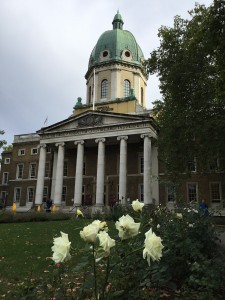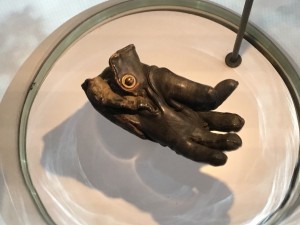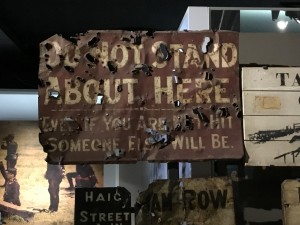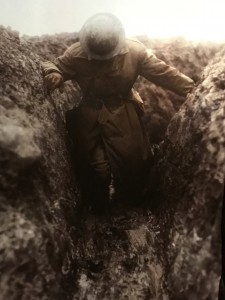
The Imperial War Museum, Lambeth North, London is the repository of collections that were first gathered during the Great War.
(P. Ferguson image, August 2018)
Thread Twelve
The heat wave has relented and for much of the day we venture forward in the downpour. Rain-water bounces off the taut umbrella towards me managing to find those points at the neckline where it can scurry its chill down one’s back. Meanwhile, I attempt to skirt the roaring streams that run along the curbs in search of drains that attempt to gulp the waves as they come towards them. The drains and my improvised two-step are not successful.
Still one ought not to complain, soldiers and civilians endured much worse on active service and on the home front. Finding an overhang I stand beneath hoping there may be an ebb to this tide, but not this tide. I carry on.

Evidence of chemical warfare are illustrated at the Imperial War Museum with this shriveled glove having gone through such an attack. Damage to lungs, eyes and skin was horrific.
(P. Ferguson image, August 2018)
Arriving at the Imperial War Museum I seek out a few specific exhibits to snap, and then conduct a reconnaissance of the gift shops anticipating a volume or two to rest amongst others in a tall stack of reading to do. Though centenary titles continue to abound, we are starting to see interest in the immediate aftermath of this conflict that gave birth to the world as we know it today.

A well fired upon Great War sign, “Do Not Stand About Here”. Imperial War Museum Collection.
(P. Ferguson image, August 2018)
Treaties, nations, political parties, demobilization, employment, veterans’ welfare, rehabilitation, prostheses, mental health, families, widows, memorialization and more. The Great War may have an end date with the armistice, 11 November 1918, but its after affects will continue…and then there will be another conflict…a Second World War with its own ramifications, its own openings and conclusions, but the dust of each conflict will never truly settle for years to come.

A Great War soldier making his way through the wet and person clinging mud of the trenches. Imperial War Museum trench scene.
(P. Ferguson image, August 2018)
——-SNIP——-
Tags: 11 November 1918, Between the Wars, Great War, Imperial War Museum, Post-World War One, Second World War
This entry was posted by pferguson
on Thursday, August 16th, 2018 at 1:47 pm and is filed under Our Thoughts.
You can follow any responses to this entry through the RSS 2.0 feed.
You can leave a response, or trackback from your own site.
About The Author

Paul has worked with the Paradigm Motion Picture Company since 2009 as producer, historian and research specialist. Paul first met Casey and Ian WIlliams of Paradigm in April 2007 at Ieper (Ypres), Belgium when ceremonies were being held for the re-dedication of the Vimy Memorial, France.
Paul's sensitivity to film was developed at an early age seeing his first films at RCAF Zweibrucken, Germany and Sardinia. Paul returned to Canada in 1967 and was captivated by David Lean's "Lawrence of Arabia" and "Bridge on the River Kwai". Over time Paul became increasingly interested in storytelling, content development, character, direction, cinematography, narration and soundtracks.
At the University of Victoria, Paul studied and compared Japanese and Australian film and became interested in Australian film maker Peter Weir and his film "Gallipoli" (1981). Paul was inspired when he learned Weir visited the beaches, ridges and ravines of the peninsula. "Gallipoli", the film, led Paul on many journeys to sites of conflict in England, France, Belgium, Holland, Germany, Malta, Hawaii, Gallipoli, North Macedonia and Salonika.
When Paul first watched documentary filmmaker Ken Burns, "The Civil War", Paul understood how his own experience and insight could be effective and perhaps influential in film-making. Combining his knowledge of Museums and Archives, exhibitions and idea strategies with his film interests was a natural progression.
Paul thinks like a film-maker. His passion for history and storytelling brings to Paradigm an eye (and ear) to the keen and sensitive interests of; content development, the understanding of successful and relational use of collections, imagery and voice. Like Paul's favorite actor, Peter O'Toole, Paul believes in the adage “To deepen not broaden.”
While on this path Paul always remembers his grandmother whose father did not return from the Great War and how his loss shaped her life and how her experience continues to guide him.





Hello i am a volunteer for the Faces To Graves Foundation in Holland. The purpose is to paint a picture about the soldier in the grave by compiling his life story, preferably by a photo and perhaps a copy of a letter or other memento. We make the stories accessible in a Digital Monument. Now we are looking for information about Trooper Mario Ruaben born on 17-3-1917 in Lethbridge. He died in WW2 and buried in Groesbeek. I saw that Mister Paul Ferguson his father was a friend of Mario Ruaben. I hope i can get in contact with Mister Ferguson. Greetings Maurice Nagelhout, Research Team Faces To Graves. infoatfacestograves.nl
Hello Mr. Nagelbout,
Very good to hear from you As a start you may wish to visit the Canadian Virtual War Memorial site where you will find images of Mario Ruaben, There is also a search feature here where you will find others related to your group’s project. All the best.
See:
https://www.veterans.gc.ca/eng/remembrance/memorials/canadian-virtual-war-memorial
https://www.veterans.gc.ca/eng/remembrance/memorials/canadian-virtual-war-memorial/detail/2232586?Mario%20Ruaben